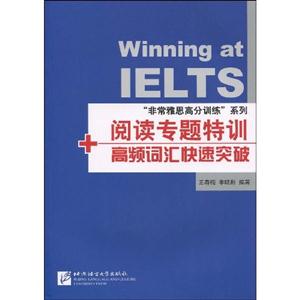-
>
鲍勃·迪伦诗歌集:1961-2012:典藏版
-
>
双城记-英文版
-
>
四级词汇词根+联想记忆法:乱序版
-
>
The secret garden
-
>
哈克贝利.费恩历险记/床头灯英语.2000词读物(英汉对照)
-
>
10000德语分类词汇联想记忆
-
>
英语词汇全书
阅读专题特训+高频词汇快速突破 版权信息
- ISBN:9787561923900
- 条形码:9787561923900 ; 978-7-5619-2390-0
- 装帧:暂无
- 册数:暂无
- 重量:暂无
- 所属分类:>>
阅读专题特训+高频词汇快速突破 本书特色
为了方便考生掌握相关词汇,《阅读专题特训+高频词汇快速突破》在每一篇文章后都附了选篇所涉及的词汇,相应的词汇在选篇中也用斜体标出,便于考生直接查阅。因为每个专题涉及的词汇并非五篇文章所能涵盖,所以《阅读专题特训+高频词汇快速突破》还特别编写了专题分类词汇学习手册,把与每个专题密切相关的词汇以英汉对照的方式列出,做成口袋书随书附赠,便于考生随身携带,随时随地查阅、记忆。《阅读专题特训+高频词汇快速突破》特点:针对中国雅思考生的常见错误和难点设计练习;用表格的形式介绍雅思考试和应试技巧,语言简练,要点突出;根据雅思听力/阅读考试的常见话题,按专题进行听力/阅读训练;根据雅思听、说、读、写考试的常见话题,提供高频词汇、短语和句型;阅读和听力分册提供袖珍高频分类词汇手册;口语分册提供VCD,供考生进行真正意义上的实战演练。
阅读专题特训+高频词汇快速突破 内容简介
本书作者根据历年雅思阅读考题,对出题的范围进行了总结,把涉及的题材大体分为十二大类别:(1)自然现象,(2)人类历史上的重大事件,(3)交通运输,(4)语言,(5)环境保护,(6)动物,(7)建筑,(8)社会问题,(9)医疗卫生,(10)农、工、商,(11)教育,(12)科学技术。本书的阅读训练部分就是按照这十二个专题分单元编写的,每个单元包括五篇由短到长的文章,每个单元的练习都覆盖各种常见题型。这样的编写让考生对每个专题都能得到充分的阅读训练,从而熟悉这一专题可能涉及的词汇、表达方式和出题方式。这样,在真正的考试中,就不会因为对题材感到生疏而影响阅读速度。 为了方便考生掌握相关词汇,本书在每一篇文章后都附了选篇所涉及的词汇,相应的词汇在选篇中也用斜体标出,便于考生直接查阅。因为每个专题涉及的词汇并非五篇文章所能涵盖,所以本书还特别编写了专题分类词汇学习手册,把与每个专题密切相关的词汇以英汉对照的方式列出,做成口袋书随书附赠,便于考生随身携带,随时随地查阅、记忆。
阅读专题特训+高频词汇快速突破 目录
阅读专题特训+高频词汇快速突破 节选
《阅读专题特训+高频词汇快速突破》作者根据历年雅思阅读考题,对出题的范围进行了总结,把涉及的题材大体分为十二大类别:(1)自然现象,(2)人类历史上的重大事件,(3)交通运输,(4)语言,(5)环境保护,(6)动物,(7)建筑,(8)社会问题,(9)医疗卫生,(10)农、工、商,(11)教育,(12)科学技术。《阅读专题特训+高频词汇快速突破》的阅读训练部分就是按照这十二个专题分单元编写的,每个单元包括五篇由短到长的文章,每个单元的练习都覆盖各种常见题型。这样的编写让考生对每个专题都能得到充分的阅读训练,从而熟悉这一专题可能涉及的词汇、表达方式和出题方式。这样,在真正的考试中,就不会因为对题材感到生疏而影响阅读速度。
阅读专题特训+高频词汇快速突破 相关资料
插图:Earthquakes in HistoryThe scientific study of earthquakes is comparatively new.Until the 18th century,few factual descriptions of earthquakes were recorded,and the natural cause of earthquakes was little under stood.Those who did look for natural causes often reached conclusions that seem fanciful today;one popular theory was that earthquakes were caused by air rushing out of caverns deep in the Earth’S interior。The earliest earthquake for which we have descriptive information occurred in China in1 177 B.C.The Chinese earthquake catalog describes several dozen large earthquakes in China during the next few thousand years.Earthquakes in Europe are mentioned as eady as 580 B.C.,but the earliest for which we have some descriptive information occurred in the mid-16thcentury.The earliest known earthquakes in the Americas were in Mexico in the late 14thcentury and in Peru in 1471.but descriptions of the effects were not well documented.By the17thcentury,descriptions of the effects of earthquakes were being published around the wodd——ahhough these accounts were often exaggerated or distorted。The most widely felt earthquakes in the recorded history of North America were a seriesthat occurred in 1811-1812 near New Madrid,Missouri.A great earthquake,whose magnitudeis estimated to be about 8.occurred on the morning of December 16,1811.Another great earthquake occurred on January 23,1812,and a third,the strongest yet’on February 7,1812.Afiershocks were nearly continuous between these great earthquakes and continued for months after wards.These earthquakes were felt by people as far away as Boston and Denver.Becausethe most intense effects were in a sparsely populated region,the destruction of human life and property was slight.If just one of these enormous earthquakes occurred in the same area today,millions of people and buildings and other structures worth billions of dollars would
阅读专题特训+高频词汇快速突破 作者简介
王春梅,毕业于于京大学外语学院英语专业,获文学硕士学位。任教于北京语言大学出国留学人员培训部,自1998年至今一直从事雅思阅读培训教学。曾以访问学者身份赴大不列颠哥伦比亚大学教育系进修英语语言教学法,并赴联合国驻巴黎教科文组织从事翻译工作。与他人合作编著出版了《IELTS阅渎模拟试题集(GcneralTraining)》。
李晓利,清华大学外语系文学硕士,任教于北京语言大学出国留学人员培训部,多年从事雅思培训的教学工作。2005年9月至2006年7月作为访问学者在英国南安普顿大学教育学院学习。编著出版了《英语交际口语》、《国家公派留学人员英语统考教材——写作》。
- >
伯纳黛特,你要去哪(2021新版)
伯纳黛特,你要去哪(2021新版)
¥23.4¥49.8 - >
朝闻道
朝闻道
¥11.7¥23.8 - >
中国人在乌苏里边疆区:历史与人类学概述
中国人在乌苏里边疆区:历史与人类学概述
¥37.1¥48.0 - >
名家带你读鲁迅:故事新编
名家带你读鲁迅:故事新编
¥13.0¥26.0 - >
大红狗在马戏团-大红狗克里弗-助人
大红狗在马戏团-大红狗克里弗-助人
¥4.4¥10.0 - >
唐代进士录
唐代进士录
¥17.1¥39.8 - >
罗曼·罗兰读书随笔-精装
罗曼·罗兰读书随笔-精装
¥40.6¥58.0 - >
月亮与六便士
月亮与六便士
¥13.4¥42.0
-
高级篇-剑桥雅思核心词汇精讲精练-MP3 included
¥19.6¥40 -
雅思词汇词根+联想记忆法(乱序便携版)
¥15.4¥28 -
听写记忆法-雅思8000词-词根词缀+真题
¥15.7¥49 -
剑桥雅思真题精讲13:学术类/新东方
¥12.2¥38 -
雅思阅读圣经
¥15.1¥35 -
雅思阅读机经词汇
¥21.6¥36
旅游目的地服务与管理
¥35.8¥49.0旅游地理学
¥42.3¥49.8陪伴孩子成长的经典故事:365夜故事(彩绘注音版)
¥15.7¥28.0小橘灯儿童文学原创馆·流浪的多多与少少
¥14.6¥24.0AH课标英语3下(人教PEP版)/状元成才路. 状元作业本
¥28.1¥46.8















